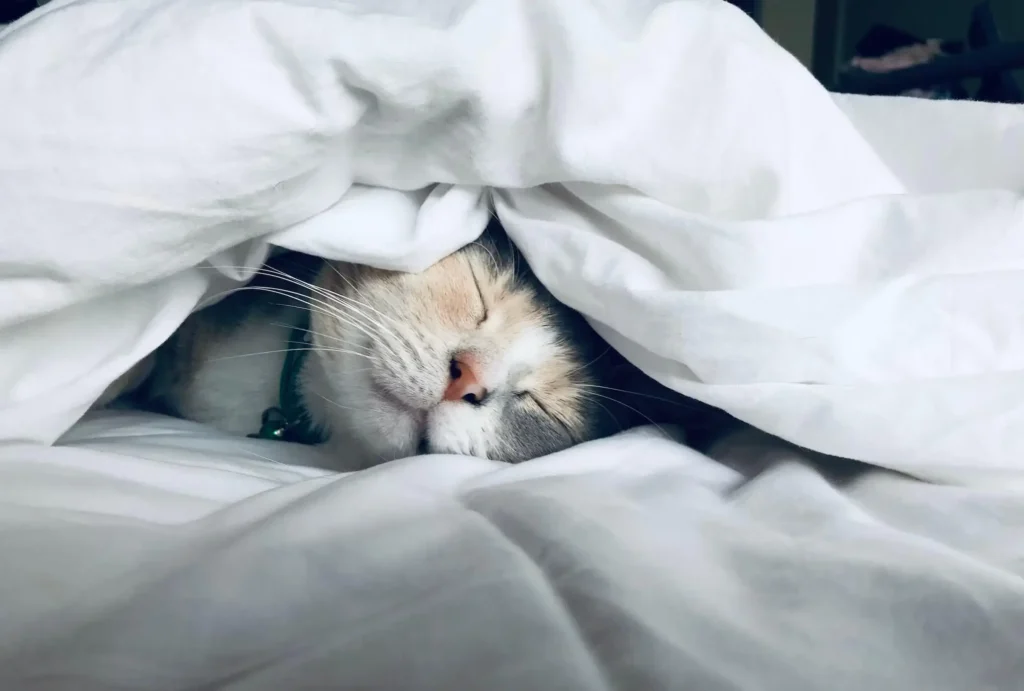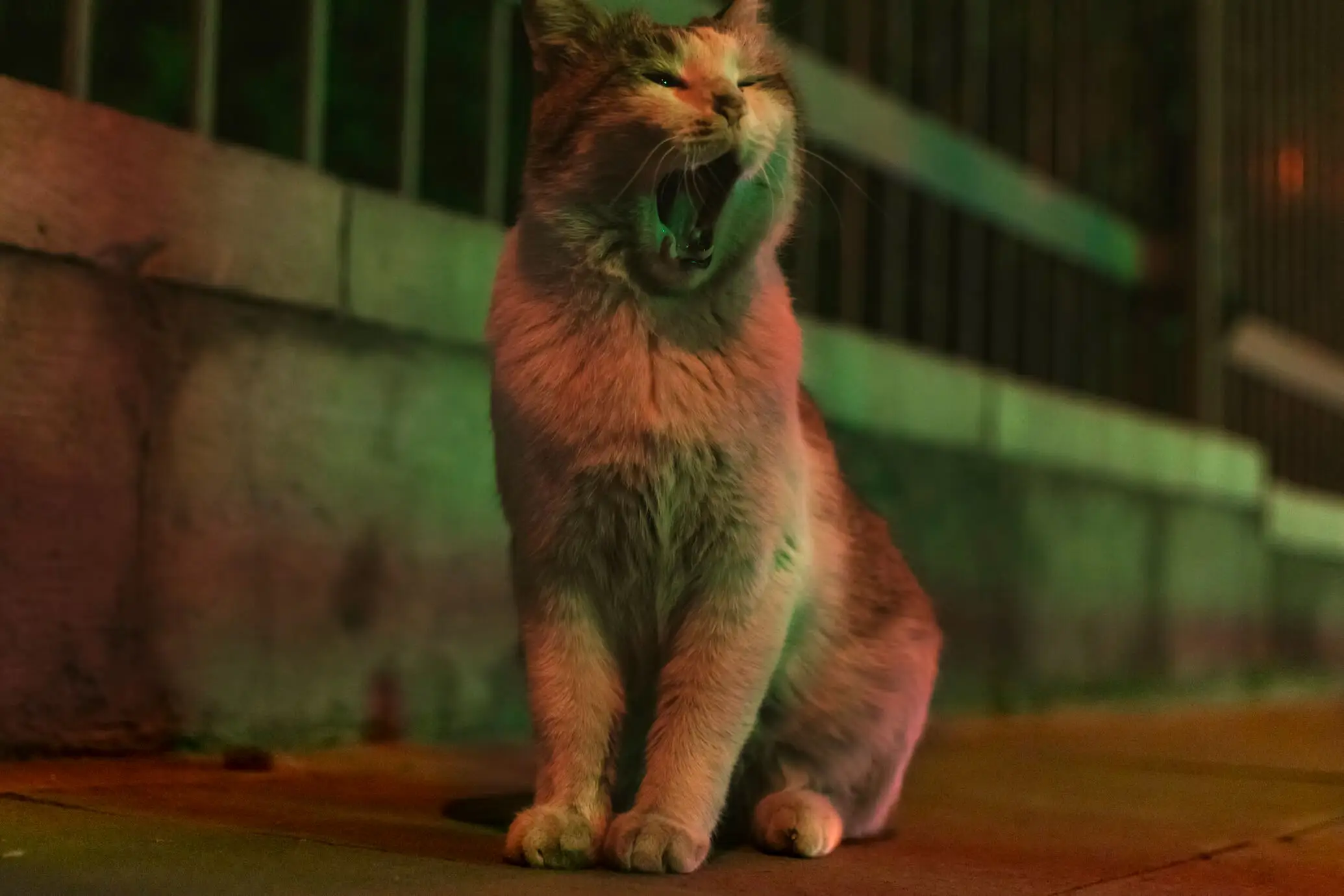Are Cats Nocturnal?
Have you ever questioned why your fluffy pals, the cats, wander and make noise mostly during the night? This complete guide will explore the world of cats in depth. It explains their nighttime behaviors and sleep habits and provides practical solutions to handle your kitty’s activity at night. Discover why knowing about this is crucial for your and your friend’s joy.
Are Cats Nocturnal or Crepuscular?
Why Are Cats So Active at Night?
Hey there! Have you ever scratched your head, wondering why your fluffy buddy is bouncing off the walls when the stars are out? Well, this whole bustle is something they’ve inherited from their wild ancestors. Imagine a quiet and calm night. Perfect for a hunting spree, right? Yep, that’s exactly what this behavior in cats is all about. Don’t miss out on noticing their activity levels during the early morning and evening, too. This is what the cool cats call crepuscular activity.
The Difference Between Nocturnal and Crepuscular
Now, there’s a buzz that cats are nocturnal, but let’s clear that air. Cats are actually crepuscular, buzzing with activity at dawn and dusk. Getting this right is super crucial. It’s all about understanding your feline friend better, making sure you’re both on the same page and ensuring a happy cat and a happy you!
Understanding Cat Sleep
When Do Cats Sleep the Most?
You know, Cats sleep so much! It’s like their superpower or something. During the bright day, they’re often curled up in dreamland. This snooze fest helps them store up all the energy they need for their nighttime escapades. It’s essential to pinpoint the opportune times your cat may catch some Z’s and the average hours per day you can expect them to be in slumber town.
Cat Sleep Patterns and Sleep Cycle
But hold on a second! The world of Cat Sleep is not shut-eye and dreams. Take a journey into understanding the diverse sleep patterns and the Sleep Cycle of cats. It’s like cracking a code. Getting the lowdown on their deep sleep and those adorable cat naps can play a huge role. It lets you fine-tune your cat’s sleep schedule, ensuring they’re not only happy but healthy and energetic, too! With this knowledge in hand, you’re all set to be the coolest cat companion around!

Cat Behavior at Night
Nocturnal Behavior and Activity Levels
Dive into the world of Cat Behavior when the stars come out. Exploring the Nocturnal life of our furry pals is like opening a book of secrets. At night, they show various shades of their personality. You might find them in lively bursts of energy or notice them trying to snag a midnight snack from the automatic feeder. It’s all part of their nightly routine. But recognizing and taking charge of these behaviors is the key to ensuring you both have a peaceful night.
Managing Your Nighttime Activity
But wait, there’s more! Navigating through their night adventures can be a breeze with the right approach. Setting limits on unwanted behaviors and nighttime activity is like setting the stage for the perfect night. It’s all about balance and understanding, making sure both you and your kitty cat sleep through the night with sweet dreams filling the quiet hours. Now, doesn’t that sound like a perfect plan?
The Hunting Instincts of Cats
Wild Cats: Nocturnal or Not?
Dive into the diverse world of “The Hunting Instincts of Cats.” It’s a common belief that all wild cats are night hunters, but surprise! Not all wild or house cats are nocturnal. It’s time to unearth the varied sleep and activity patterns among different wild and house cats, revealing a world beyond the myths.
Feline’s Hunting and Feeding Habits
Now, let’s talk about the hunting instincts of cats. Have you ever wondered why your kitty springs into action in the evening? This is tied to their hunting instincts, which link back to their ancestors’ crepuscular behavior. It’s in their nature! Here’s a tip: feeding your cat at specific periods can make a world of difference in their antics. Discover the connections and watch as the night turns peaceful, syncing with the natural rhythms of your beloved.
Keeping You and Your Cat Happy at Night
Tips to Keep Your Cat Less Active at Night
Delve into this insightful guide, “Keeping You and Your Cat Happy at Night,” for keeping the peace with your feline friend. It’s simple! To keep your cat less active at night, engage them with physical stimulation and a play session before bedtime. These are practical, tried-and-true tips that will help your pet and you enjoy a calm and restful evening.
Ensuring a Good Night’s Sleep
Is a good night’s sleep feeling like a dream? Learn effective methods to ensure you and your cat slumber. Managing your nighttime behavior is crucial. Whether it’s keeping them out of the bedroom or tweaking their feeding schedule, every bit helps in achieving peaceful nights. Together, let’s turn that dream of a good night’s sleep into reality for both you and your feline companion.
Conclusion
To wrap it up, getting to know your nighttime behavior and sleep routines is key to a peaceful home. Use the helpful advice and ideas given here to make sure you and your fluffy friend have calm and serene nights together. It’s all about understanding and managing their nocturnal activities for a happier and healthier life together. Let’s embark on this journey of peaceful nighttime living with our feline friends!
FAQ
Why are cats nocturnal animals?
Cats are actually more crepuscular than nocturnal, being most active during dawn and dusk.
How can I manage my nighttime activity?
Employ strategies like adjusting feeding times, providing ample stimulation, and creating a conducive sleep environment.
Are all wild cats nocturnal?
Not all wild cats are nocturnal. It varies among different species.
What factors affect a cat’s sleep pattern?
Factors include age, health conditions, and feeding habits.
How can I ensure a good night’s sleep with a cat in the house?
Manage your cat’s nighttime behavior, provide a separate sleeping space, and maintain a consistent schedule.
Are cats crepuscular animals?
Yes, cats are crepuscular animals by nature. This means that they are most active during the twilight hours of dawn and dusk.
Do all domestic cats tend to sleep during the day?
Most domestic cats do tend to sleep during the day, but not all. Cats’ environments and the behaviors they pick up from their owners can affect their sleeping patterns.
Is my cat being active at night a normal behavior?
Yes, as crepuscular animals, it is normal for cats to be active at night. Although they are not strictly nocturnal, many cats choose to sleep during the day and become more active during the nighttime hours.
Is my senior cat’s sleep-at-night pattern different from that of younger cats?
Senior cats may sleep more than younger cats overall, but they will still exhibit the crepuscular behavior inherent in cats. A major change in a senior cat’s sleeping pattern is a reason to consult with a veterinarian.
How can I get my cat to sleep at night?
Incorporating play with your cat during the evening can help. Providing a burst of activity can tire out your cat and encourage them to sleep at night. Adjusting feeding schedules can also influence your cat’s sleep cycle.
Why do many cats tend to wake their owners up early in the morning?
As crepuscular animals, many cats are naturally most active during the early morning hours. This is often the time when they want to play, hunt, or be fed.
How can I take my cat’s crepuscular nature into account when adjusting my schedule?
Understanding that many cats are most active during the early morning and evening can help you plan your day accordingly. For instance, schedule playtime during these hours to keep your cat entertained and active.
Do cats show any diurnal (active during the day) behavior?
While cats are typically crepuscular, they can exhibit certain diurnal traits, particularly domestic cats that adapt to the schedules of their human owners.
Is there any way to make cats more diurnal?
It can influence your cat’s sleeping habits by adjusting your routine, changing feeding times, or incorporating more play during the daytime hours. However, remember that cats are naturally crepuscular, and major changes in behavior should be discussed with a veterinarian.
What should I do if my cat’s sleeping or active patterns change dramatically?
Any dramatic shift in your cat’s habits, including sleep and activity levels, should be a cause for consultation with your veterinarian. This may signify health issues that need to be addressed.
